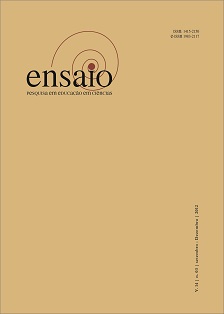CONTRIBUIÇÃO DA FILOSOFIA DA MICROBIOLOGIA PARA FUNDAMENTAR A ZONA RELACIONAL DO PERFIL CONCEITUAL DE VIDA
CONTRIBUTION OF PHILOSOPHY OF MICROBIOLOGY IN SUPPORT OF THE RELATIONAL ZONE OF THE CONCEPTUAL PROFILE OF LIFE
DOI:
https://doi.org/10.1590/1983-21172012140304Palavras-chave:
Conceito vida ; Perfil Conceitual; Ensino de Biologia; Filosofia da Biologia.Resumo
Discute-se, neste estudo, como as reflexões da filosofia da Microbiologia podem contribuir para fundamentar a zona relacional do conceito biológico vida e os benefícios que traria para o aprendizado dos alunos em virtude de sua utilização em sala de aula. A partir da definição do conceito vida como adaptação flexível, argumenta-se sobre a possibilidade de que o ensino em Biologia seja sintético ao invés de meramente analítico. Para alcançar esse objetivo, fundamenta-se na zona relacional do conceito vida e se discute de que formas as consequências dessa fundamentação podem contribuir para a prática do ensino em Biologia. Simultaneamente, espera-se contribuir para reforçar o programa de pesquisas sobre perfis conceituais, uma vez que isso trará consequências positivas para a compreensão dos aspectos ontológicos e epistemológicos das zonas do perfil de um conceito científico.
We discuss how reflections on the philosophy of microbiology may contribute to set up the foundations of a relational zone for the biological concept of life and how it would improve student learning if used inclassroom. Starting from the definition of life as flexible adaptation, we argue that a synthetic treatment of biology teaching should replace the current analytical approach. For that purpose, we lay out the fundamentals of the relational zone for a concept of life and discuss how the consequences arising from the definition of such fundamentals may contribute to the practice of biology teaching. At the same time, we hope that our contribution will strengthen the research program on conceptual profiles, for this shall bring positive consequences to the comprehension of the ontological and epistemological aspects of the profile zones of a scientific concept.
Referências
AUSUBEL, D.; NOVAK, J.; HANESIAN, H. Psicologia Educacional. Rio de Janeiro: Interamericana, 1980.
ARAVIND, L.; ANANTHARAMAN, V.; LYER, L. M. Evolutionary connections between bacterial and eukaryotic signaling systems: a genomic perspective. Current Opinion in Microbiology, [s.l], v 6, p. 490-497, 2003.
BACHELARD, G. A filosofia do não. São Paulo: Abril Cultural (Col. Os Pensadores), 1978.
BEDAU, M. The nature of life. In: BODEN, M. The philosophy of artificial life. Oxford: Oxford University Press, pp. 332-357, 1996.
BEDAU, M. Four puzzles about life. Artificial Life, [s.l], 4(2), p.125-140, 1998.
BRASIL, Ministério da Educação e Cultura. Orientações curriculares para o ensino médio - ciências da natureza, matemática e suas tecnologias. Brasília: MEC, 2006.
COUTINHO, F. A. Construção de um perfil conceitual de vida. 2005. Tese (Doutorado em Educação) - Faculdade de Educação, Universidade Federal de Minas Gerais, 2005.(2005)
COUTINHO, F. A.; MORTIMER E. F.; EL-HANI, C. N. Construção de um perfil para o conceito biológico de vida. Investigações em Ensino de Ciências, v.12(1), p. 115-137, 2007.
DAVEY, M. E.; O'TOOLE, G. A. Microbial Biofilms: from ecology to molecular genetics. Microbiology and Molecular Biology Reviews, [s.l], 64: 847-867, 2000.
DUPRÉ, J.; O'MALLEY, M. A. Varieties of living things: life at the intersection of lineage and metabolism. Philosophy and Theory in Biology, [s.l], v. 1; p. 003, 2009.
EMMECHE, C.; EL-HANI, C. N.Definindo Vida. In: EL-HANI, C. N.e VIDEIRA, A. A. P.(Orgs.). O que é vida? Para Entender a Biologia do Século XXI. Rio de Janeiro: Relume Dumará, 2000.
FENCHEL, T. Origin and early evolution of life. Oxford: Oxford University Press, 2002.
FEYERABEND, P. Against method. London: Verso, 1975.
HANSON, N. R. Patterns of discovery. Cambridge: Cambridge University Press, 1958.
KAFATOS, F. C.; EISNER, T. Unification in the century of biology. Science, [s.l], v.303, p. 1257, 2004.
KITCHER, P. The advancement of science. Oxford: Oxford University Press, 1993.
KUHN, T. The structure of scientific revolutions. Chicago: University of Chicago Press, 1970.
MAHNER, M. Operationalist Fallacies in Biology. Science & Education, [s.l], v.7, p. 403-421, 1998.
MARGULIS, L. O planeta simbiótico. Rio de Janeiro: Rocco, 2001.
MARGULIS, L. Do kefir à morte. In: BROCKMAN, J. e MATSON, K. As coisas são assim. São Paulo: Cia das Letras, 2002.
MORAN, N. A.; BAUMANN, P. Bacterial endosymbionts in animals., Current Opinion in Microbiology [s.l], 3, p. 270-275, 2000.
MORAN, N.A.; JARVIK, T. Lateral transfer of genes from Fungi underlies carotenoid production in aphids. Science. [s.l], v328, p. 624-627, 2010.
MORTIMER, E. F. Conceptual Change or Conceptual Profile Change? Science and Education [s.l], v. 4, p. 267-285, 1995.
MORTIMER, E. F. Linguagem e formação de conceitos no ensino de ciências. Belo Horizonte: Ed. UFMG, 2000.
O'MALLEY, M. A.; DUPRE, J. Towards a philosophy of microbiology. Studies in History and Philosophy of Biological and Biomedical Sciences, [s.l], v. 38, p. 775-779, 2007a.
O'MALLEY, M. A.; DUPRE, J.Size doesn' t matter: towards a more inclusive philosophy of biology. Biology and Philosophy, [s.l], 22, p. 155-191, 2007b.
O'TOOLE, G.; KAPLAN, H. B.; KOLTER, R. Biofilm formation as microbial development. Annual Review of Microbiology, 54, p. 49-79, 2000.
REANNEY, D. C., ROBERTS, W. P. AND KELLY, W. J. Genetic interactions among microbial communities. In: BULL A. T. AND SLATER J. H. (Eds), Microbial Interactions and Communities., London, UK Academic Press, 1982. pp. 287-322.
SAGAN, L.M. On the origin of mitosing cells. Journal of Theoretical Biology, [s.l], v.14, p. 225-274, 1967.
TIMMIS, N. J. et. al. Endosymbiotic gene transfer: organelle genomes forge eukaryotic chromossomes. Nature Reviews Genetics, [s.l], v.5, p. 123-135. 2004.
VIDEIRA, A. A. P Para que servem as definições? In: EL-HANI, C. N.e VIDEIRA, A. A. P (Orgs.).. O que é vida? Para Entender a Biologia do Século XXI Rio de Janeiro: Relume Dumará, 2000.
WERTSCH, J. V. Vygotsky and the social formation of mind. Cambridge, MA: Havard University Press. 1985.
ZHURAVLEV, Y. N..; AVETISOV, V. A. The definition of life in the context of its origin. Biogeoscience, [s.l] v. 3: 281-291, 2006.


